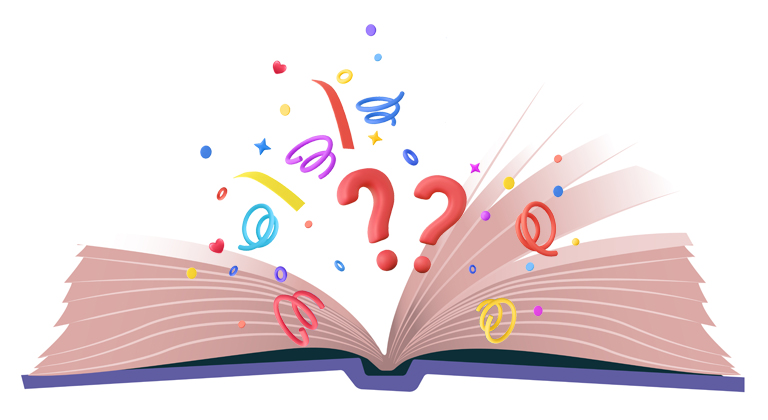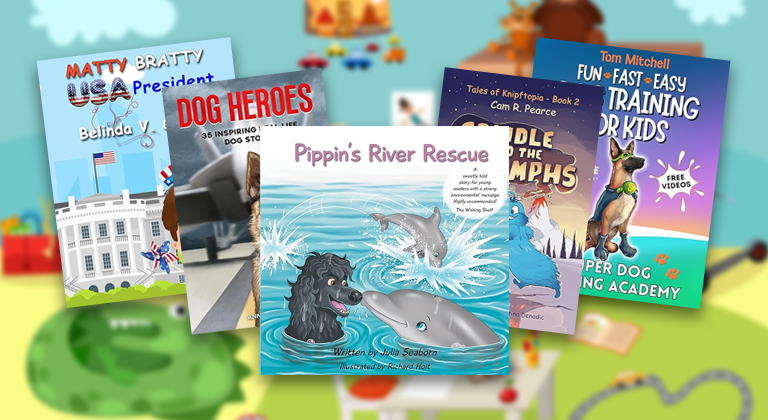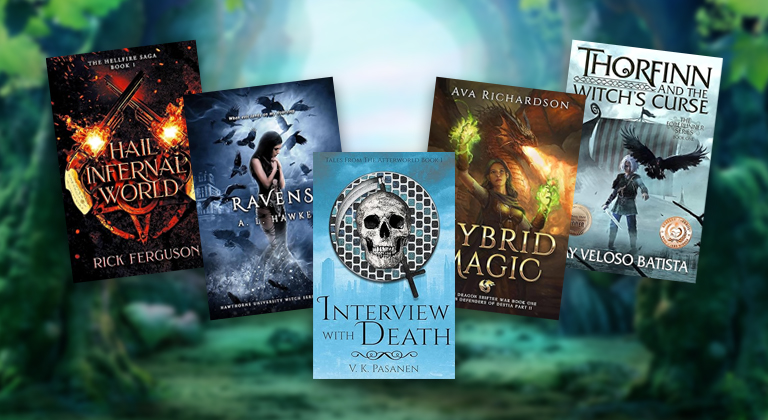Conquer Self Doubt and Just Hit Publish
If you’ve been sitting on the fence about publishing because you’ve been battling insecurities about whether or not your voice is important enough to be heard, fear not: You’re not alone. Self doubt can be one of the biggest obstacles to overcome in your self-publishing journey, and some of the greatest and most influential authors that have ever put pen to paper are known to have struggled with that same lack of confidence.
Yet they somehow managed to push through and the world is better for it.
Today, Ginger shares a personal story that illustrates how this issue hit very close to home with him. This experience impacted him so deeply that he felt compelled to write this article, stressing the importance for authors to push past these fears and just hit publish.
Recently, I’ve been spending time with my 86-year old father, talking about his life. I felt it was important to have some accurate records for future generations and it’s much more valuable to hear them directly from the source than try to piece them together after the fact, using half-remembered anecdotes or bits of data cobbled together through Ancestry.com and other services.
But what I found remarkable was that the things my father told me that really stood out weren’t necessarily the “important” things he’d done – like serving with the Royal Air Force, driving to Pakistan in a Land Rover, or helping to build a nuclear power station in the UK.
Instead, it was the human stories that I found most valuable – like how he’d only gone to Pakistan because he’d failed his accountancy exams, or that while he’d helped build a nuclear power station, the experience had led him on a path away from engineering and into finance.
Perhaps most remarkable of all was the story of how he’d almost been a writer, once. Here was a man who’d undeniably shaped my path into becoming a published author through his love of books and passion for classic science fiction. However, until we’d had the first of our talks together, I never realized that he, too, had once thought about becoming an author.
But the story he tells isn’t a happy one. He used to commute to London every morning, and loved to read the science fiction short stories published in The Daily Express newspaper. Each week, they’d print an address to submit your own short stories to. My father had been so inspired, he’d once actually written one himself.
But unfortunately, he’d had a moment of doubt before putting the story into an envelope. He wondered why anybody would read his story. He doubted that anybody would have any interest in reading a young man’s science fiction scribbles during the age of science fiction juggernauts like Arthur C. Clarke, Isaac Asimov, and Ray Bradbury.
My father tore up his story, and it was never spoken of again – at least until he finally shared the anecdote with me nearly seventy years later.
For some reason, out of all his stories, that was the one that hit the hardest. Here I am, having dedicated my life to writing, and it would never have happened without my father. It was his library of science fiction paperbacks that got me inspired to read. It was his dutiful compliance in reading my early stories that encouraged me to keep going. Today, I’ve sold over 69,000 copies of my books – and I’d have never shifted a single copy without my father.
So, of course, I was gutted that I never got to read his story. I was sad that nobody else got a chance to, either – and it got me thinking about the importance of writing in a way that not many of us talk about.
I’ve always been very focused on the business of writing – how to make a living from writing and self-publishing books. However, books are far more than just a business. They’re a testament. Each one marks a moment in time in which an author poured themselves onto the page, and those pages are then available for anybody to read in the future – and even if it’s not enough to make a living from what you write, that doesn’t stop the very existence of those pages being important.
Take my father’s ill-fated story, for example. Of course I’d have loved to have read it. Not just because it was written by my father – a young, brash version of my father I never got to meet. I also feel like it would have been a fascinating science fiction story because I knew how passionate my father was about science fiction, and how he’d have been inspired by some of the greatest names in sci-fi writing while they were publishing at their peak.
But alas, I’ll never get to read that story – and the sadness of that loss inspired me to write this article. In it, I want to talk about how the writing that you’re just about ready to give up on – the stuff you don’t feel is good enough to publish – might just be some of the most important writing you’ve ever done; and the world deserves to read it.
The Courage to Create
Traditional publishers often complain that self-publishing lets anybody get published. However, advocates for indie-publishing argue the same: Self-publishing is great because it lets anybody get published.
Self-publishing has become an easier, more powerful avenue for any writer to share their creativity, stories, and perspectives with a broader audience – without having to jump through hoops to find an agency or publisher first. However, just because self-publishing is easier doesn’t make it easy. The journey from manuscript to published work can be daunting, filled with self-doubt and fear of judgment.
However, there’s something noble in finding the courage to bring your work into the world. It’s a courage I wish I could go back in time and inspire in my father, just like he inspired me. In finding the courage to publish your work, you not only embark on a personal journey of growth and development, but you also contribute to the rich tapestry of literature.
And even if you only ever get a few sales, there’s still a profound importance in realizing that there are readers out there who will value and connect with the stories you tell them, even if you can’t imagine that right now! Whatever it is you write about, the very act of doing so validates the existence of those who see the world through the same lens as you do. That’s why you have to do it.
Finding the Audacity to Write
But of course, it’s not as easy as just saying “do it.” One of the major mental obstacles authors come up with when thinking about publishing their work is: “Who’d ever read this?”
But that’s an important question all authors should ask themselves. Everything that gets written should have a purpose. Non-fiction books educate. Fiction books entertain. Sometimes, books from either category can do both. There’s a reason you were inspired to write in the first place – and understanding what that “why” is remains the quickest way to uncover your purpose as a writer.
Because only you can write what you write. Only you have the personal experiences and passions that justify putting your pen to paper. One of the key challenges for self-published authors is overcoming the fear of exposing those personal experiences and vulnerabilities in their work. However, history has shown that some of the most impactful and resonant pieces of literature have been born from an author’s willingness to do exactly that. In fact, I even wrote a blog post about how important it is for authors to share intimate aspects of their lives because of how important some readers might find them.
I thought a great way to encourage writers suffering from that self doubt would be to look into the past and see how some of the greatest writers of our time struggled with those same issues. Just like listening to how my father’s failures was often more important to me than hearing about his successes, I think it’s inspiring to see how some of the greatest writers of our age nearly quit the business too.
How H.G. Wells Almost Didn’t Become the Father of Science Fiction
One great example that might have inspired my father to publish his short science fiction story, had he known about it, comes from H.G. Wells. Often considered one of the greatest and most influential science fiction writers of all time, H.G. Wells actually fought bitterly with his family when it came to his attempts to become a writer – with them disapproving of his ambitions in the same way that the families of many aspiring writers do today.
Fortunately, Wells’ passion for writing was stronger than his desire to appease his family – and soon the critical acclaim received for the early stories he had the courage to publish helped prove that he was right in pursuing his passion. Yet at times, he’d experienced the same self-doubt that my father had; and I wonder if Dad would never have torn up his manuscript if he’d been aware that H.G. Wells faced the same struggles as he did.
How Ernest Hemingway Wrote by Example
Another example of a writer struggling with self-doubt is Ernest Hemingway – something that might seem impossible given the impact Hemingway had on modern literature.
However, as a young man, he faced intense struggle when writing his novel The Sun Also Rises.
Published in 1926, The Sun Also Rises is now considered an iconic novel that explores the experiences of the “Lost Generation” following World War I.
Hemingway, a decorated war veteran himself, drew deeply from his personal struggles when writing the book, including a temporary state of impotence he experienced resulting from injuries sustained in the conflict.
His own experiences were hoisted upon the protagonist of the novel, Jake Barnes, who also grappled with sexual impotence, mirroring Hemingway’s challenges. By weaving his own experiences into the narrative, Hemingway created a work that exposed how deeply intertwined sexual virility is with a man’s self-worth, and that resonated with countless readers on a deeply personal level.
It was only by having the courage to share such a vulnerable aspect of his life that Hemingway’s book had the impact that it did; and perhaps his career would never had taken off otherwise. However, it’s important to appreciate just how much pressure the hyper-masculine Hemingway must have felt about whether or not to share the humiliating details of his own personal injury.
How Sylvia Plath Wrote about Depression
Similarly, Sylvia Plath’s The Bell Jar is another example of how important it was for an author to bare her soul in literature. Plath, known for her confessional style of writing, delved into the struggles of mental illness and societal expectations in her semi-autobiographical novel, and the world would have been worse off if she hadn’t had the courage to publish it.
The protagonist, Esther Greenwood, grapples with her own mental health issues, paralleling Plath’s real-life battle with depression. Because she wrote so authentically about the subject, millions of readers saw themselves in the story and that’s why it’s become so highly regarded.
Only by laying bare her innermost thoughts and struggles could Plath create a work that resonated with readers and also served as a powerful reflection of the human condition – but the decision to do so was not one she made lightly.
How Amanda Hocking Had the Courage to Pursue Self-Publishing Success
Most of the authors reading this blog post are self-published, and therefore another great example I’d like to highlight comes from one of the most successful self-published authors of our time; the iconic Amanda Hocking.
Amanda Hocking is an American author many of us know best for her incredible success as a self-published writer in the paranormal romance genre. Today, Hocking has gained widespread recognition for her ability to connect with readers and achieve remarkable success through self-publishing platforms; but it took some real courage for that to happen.
In the early 2010s, Amanda Hocking took the risk of independently publishing her novels, targeting the young adult paranormal romance category. She soon become known for her Trylle Trilogy series, Watersong series, and the My Blood Approves series. These novels often feature elements of fantasy, romance, and supernatural themes woven together in a way most traditional publishers weren’t comfortable publishing.
So Amanda Hocking had to find the courage to embrace self-publishing at a time when it wasn’t as mainstream as it is today. She used platforms like Amazon Kindle Direct Publishing to release her books directly to readers, bypassing traditional publishing routes – and was rewarded when her success in the self-publishing arena garnered attention from both the media and the traditional publishing industry.
Hocking’s ability to tap into the digital market and connect with a global audience was a game-changer for many aspiring authors. Her novels resonated with readers who were looking for fresh and engaging stories outside the traditional publishing channels. The success of her self-published works eventually led to traditional publishing deals, further solidifying her impact on the literary world – and all of it demonstrates incredible courage in her convictions.
Hocking could very easily never have attempted to share her work with a wider audience – but literature is better because she did so. Her willingness to embrace unconventional themes and explore the depths of human emotions resonated with readers who were seeking an authenticity in storytelling that traditional publishing just couldn’t provide at the time. Hocking’s journey from self-published pariah to mainstream success showcases the importance of staying true to one’s voice and having the courage to share stories that might not have conformed to the arbitrary expectations of traditional publishing.
Her courage rewarded a legion of eager readers; and also helped pave the way for the thousands of successful self-published authors who followed in her wake.
Conclusion
The act of publishing, especially for self-published authors, goes beyond the mere sharing of words on paper. It’s an act of vulnerability, a declaration that one’s thoughts and experiences are worthy of being heard. The fear of judgment and rejection can be paralyzing, but overcoming that paralysis is essential to reach a greater audience; and if self-publishing has proven anything, it’s that an audience probably does exist; and it’s practically crying out for more diverse voices and narratives in publishing.
Every author – including you – possesses such a unique perspective. By embracing your individuality and finding the courage to share it with the world, you too can make your own contribution to the richness and diversity of literature (and perhaps inspire other authors to follow in your footsteps.)
The journey of self-publishing is not without its obstacles. Rejections, negative reviews, and the uncertainty of success can be discouraging. However, it’s crucial to understand that the value of your writing extends far beyond conventional measures of success. Even if a book doesn’t become a bestseller, the impact it can have on an individual reader should never be underestimated; and that can only happen if you find the courage to push past your self doubt and just hit “publish.”












What an inspiring story about your father! Thank you for sharing. I hope he can remember his story and tell you what it was about.
Good post on conquering self-doubt. Came at the right time for me, as I have a greater lack of confidence on my third book than with my first. Likely, it’s due to walking into publishing my first book all starry-eyed, and with book #3, I’m writing with the thought that paying for all the editing and promos can only go on for so long before my wife sits me down for a little chat.
But it’s always good to be reminded that others (especially those who’ve ultimately found success), have had the same struggles–misery loves company sums it up.